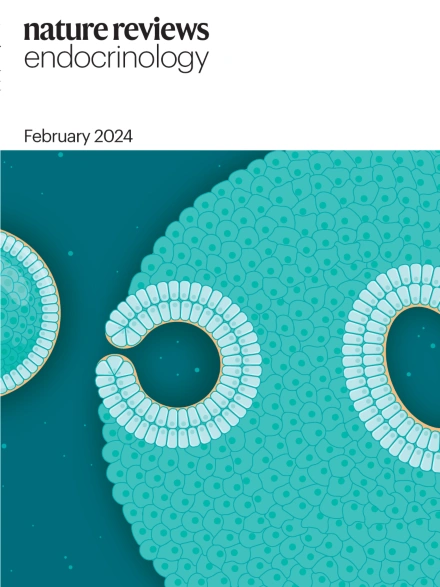脂肪组织的健康:雌激素很重要。
IF 40
1区 医学
Q1 ENDOCRINOLOGY & METABOLISM
引用次数: 0
摘要
绝经期妇女比绝经前妇女更有可能以多余脂肪组织的形式增加体重,这些脂肪组织优先沉积在内脏中。这种身体组成的变化,主要是由雌激素水平下降引起的,增加了心脏代谢疾病的风险。雌激素是参与许多代谢过程的关键激素,包括脂肪组织。鉴于脂肪组织健康对全身代谢的强烈影响,进一步了解雌激素影响脂肪组织表型和功能的机制至关重要。脂肪组织不仅受雌激素信号的影响,也是循环雌激素的主要来源,也是男性和绝经后妇女唯一可察觉的雌激素来源。因此,肥胖女性的雌激素循环水平较高,但这一事实是否会导致肥胖的各种合并症(如癌症、代谢综合征和骨质疏松症)尚不清楚。在生命后期,脂肪组织中雌激素作用的丧失可能会导致组织功能下降,并在更年期及以后扩大体积。在这篇综述中,我们讨论了雌激素在脂肪功能健康中的作用,以及这些功能如何影响肥胖和代谢疾病的风险。本文章由计算机程序翻译,如有差异,请以英文原文为准。
Health of adipose tissue: oestrogen matters.
Menopausal women are more likely than premenopausal women to gain weight in the form of excess adipose tissue, which becomes preferentially deposited in the viscera. This body composition shift, largely driven by declining oestrogen levels, increases cardiometabolic disease risk. Oestrogens are key hormones involved in many metabolic processes, including in adipose tissue. Given the strong influence that adipose tissue health has on systemic metabolism, additional insights into mechanisms by which oestrogens affect adipose tissue phenotype and function are critical. Not only is adipose tissue affected by oestrogen signalling, adipose tissue is also a major source of circulating oestrogens, and the only appreciable source of oestrogens for men and postmenopausal women. Therefore, women with obesity have higher circulating levels of oestrogens, but whether this fact contributes to the diverse comorbidities of obesity (such as, cancer, metabolic syndrome and osteoporosis) remains unclear. Loss of the effects of oestrogen in adipose tissue later in life could underlie the tissue's functional decline and expanded mass during menopause and beyond. In this Review, we discuss the roles of oestrogens in adipose functional health, and how these functions influence obesity and metabolic disease risk.
求助全文
通过发布文献求助,成功后即可免费获取论文全文。
去求助
来源期刊

Nature Reviews Endocrinology
医学-内分泌学与代谢
CiteScore
42.00
自引率
0.70%
发文量
158
审稿时长
6-12 weeks
期刊介绍:
Nature Reviews Endocrinology aspires to be the foremost platform for reviews and commentaries catering to the scientific communities it serves. The journal aims to publish articles characterized by authority, accessibility, and clarity, enhanced with easily understandable figures, tables, and other visual aids. The goal is to offer an unparalleled service to authors, referees, and readers, striving to maximize the usefulness and impact of each article. Nature Reviews Endocrinology publishes Research Highlights, Comments, News & Views, Reviews, Consensus Statements, and Perspectives relevant to researchers and clinicians in the fields of endocrinology and metabolism. Its broad scope ensures that the work it publishes reaches the widest possible audience.
 求助内容:
求助内容: 应助结果提醒方式:
应助结果提醒方式:


